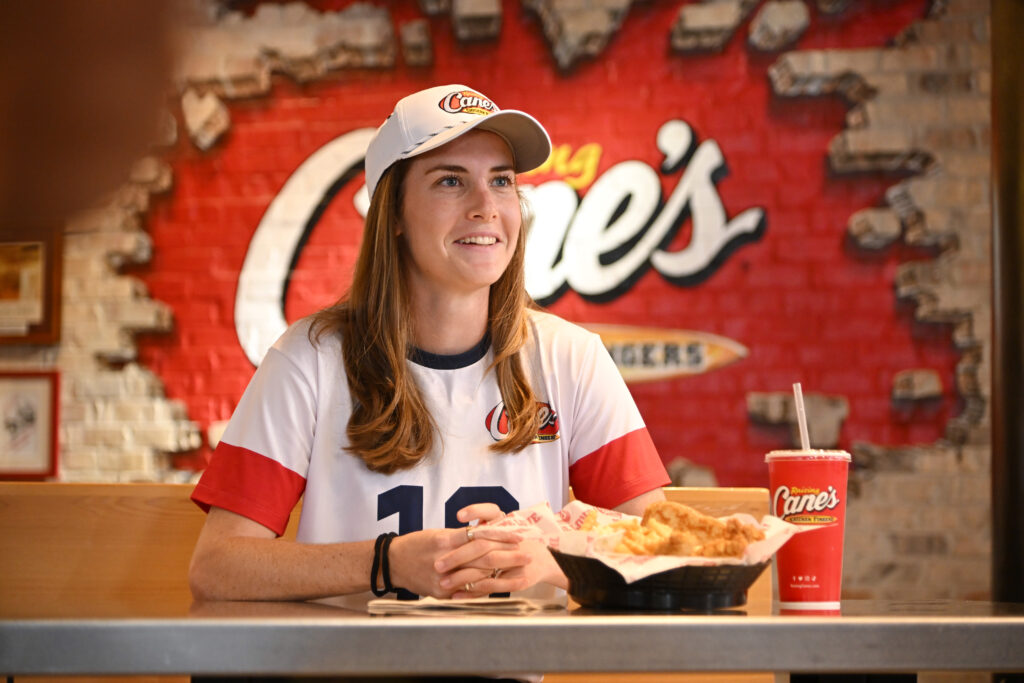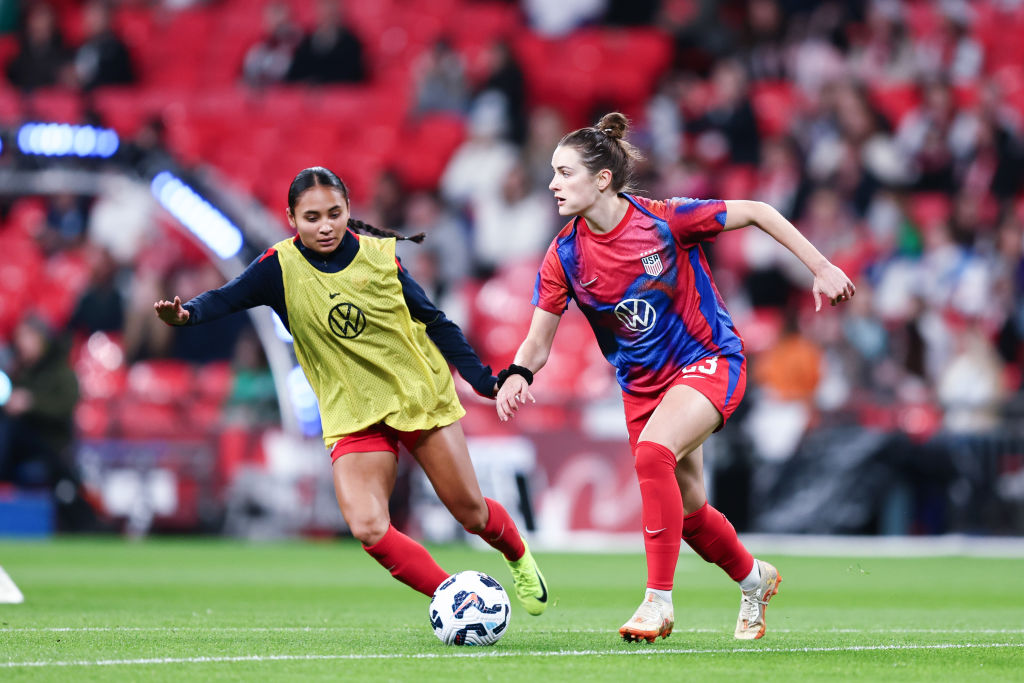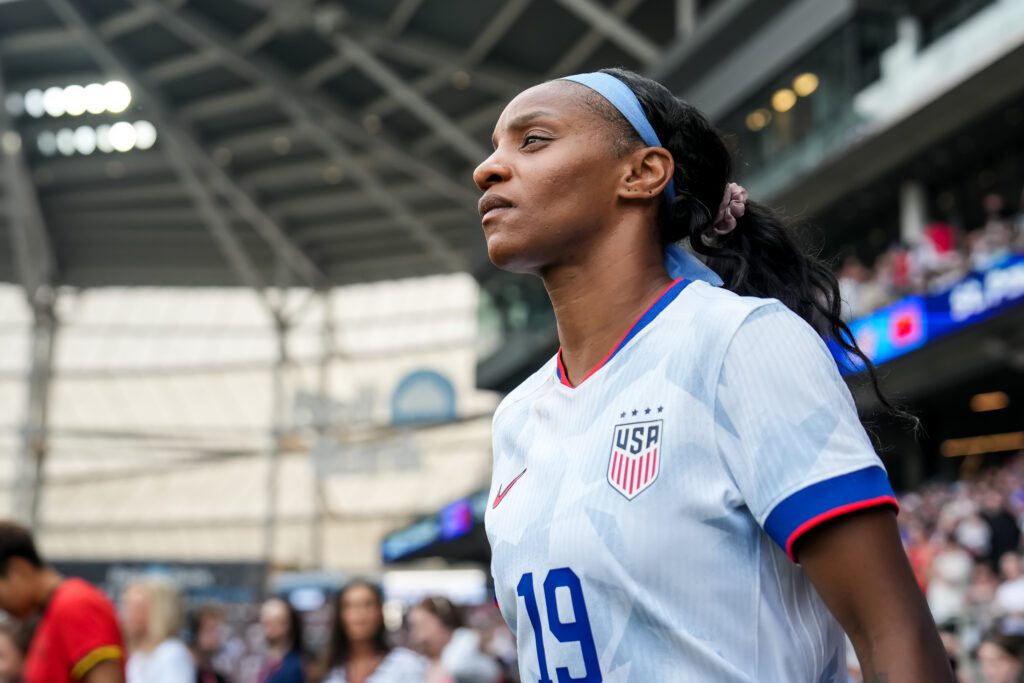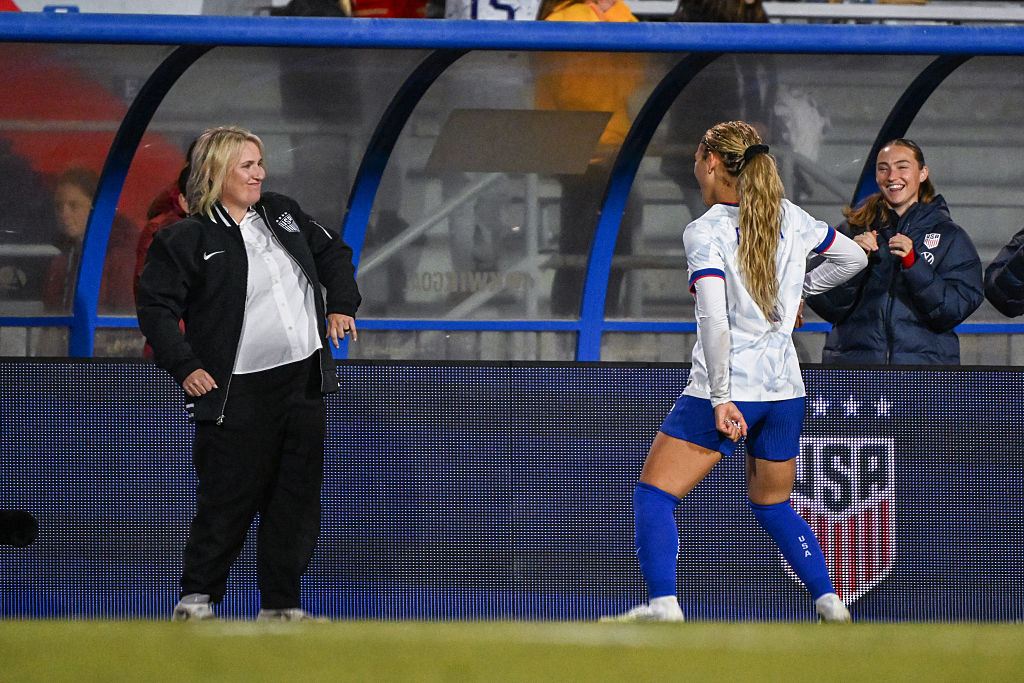Decorated defender Tierna Davidson might be both the youngest and wisest veteran on the USWNT.
The Menlo Park, California native has been a fixture on the senior squad since 2018, picking up accolades during the team’s 2019 World Cup, 2021 Olympic bronze, and 2024 Olympic gold medal runs. Throughout her tenure, Davidson's played under three different USWNT coaches — four counting two-time interim manager Twila Kilgore — underwent multiple roster and tactical shifts, fought her way back from serious injury, and witnessed a generation of her teammates pass the baton to a young and hungry new class.
Given all that, it’s almost impossible to believe she’s only 25.
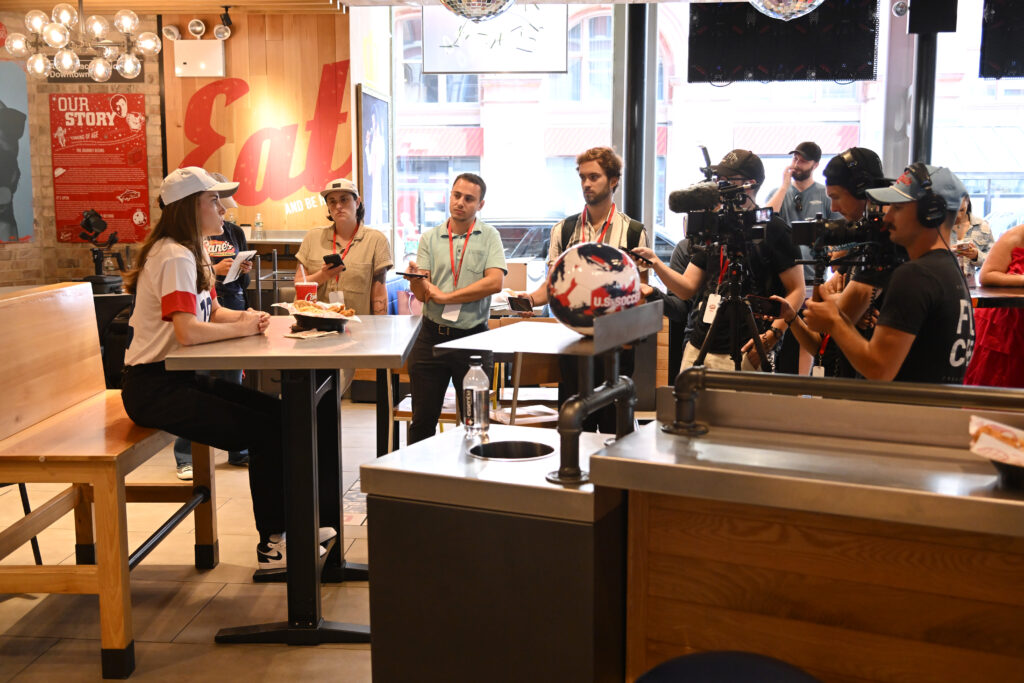
"[It] was so exciting to see all of these young players grow into themselves in this tournament and really express themselves on the field — to see the personalities, to see the styles of play, to see the chemistry building — when I was first on this team, I was just so focused on playing," Davidson told reporters last week during a promotional appearance at Raising Cane's Chicken Fingers in New York. "Being a little bit myopic about it, you don't really see those growth patterns — perhaps I was the one doing that growth — but to see some of the younger players have such a fantastic tournament experience, I think it bodes really well for the future of the team."
Davidson’s former myopathy is more than understandable. Six years ago, the then 20-year-old was the youngest player on former coach Jill Ellis’s 23-player World Cup roster. And with an average age of 28, more than half of that 2019 squad arrived in France with prior World Cup experience. Yet it was Davidson’s first major tournament at the senior level — and, ultimately, her first major tournament win.
Now closer in age to more recent additions like Trinity Rodman (22), Croix Bethune (23), and fellow Stanford Cardinal Naomi Girma (24) but with the same national team experience as players five to 10 years her senior, Davidson is able to serve as a bridge between the USWNTs of the past and today’s iteration. And it’s something she’s tapped into as she’s evolved her own style of play over the years.
"I've tried to take everything that I've learned from some of the older players and then also from myself over the past few years and commit that to my game," she said. "Playing with different players brings out new and exciting things in your game, and as I've made connections with some of the players on the field that I haven't gotten a chance to play with as much, different parts of my game come out."
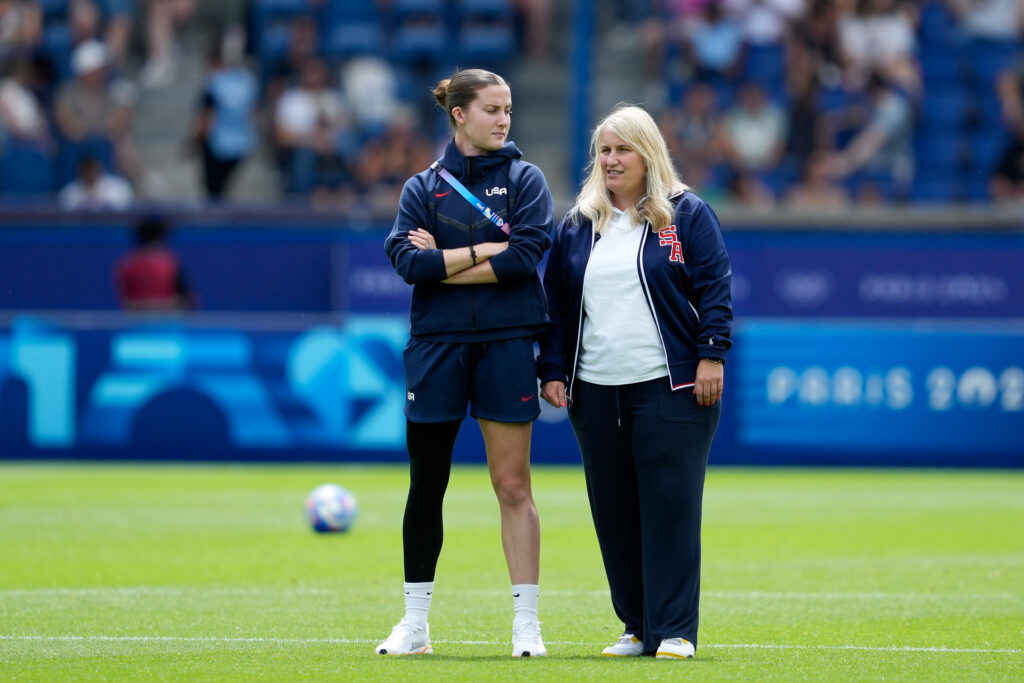
Ushering in the USWNT's Emma Hayes Era
One person Davidson hadn’t played with much prior to the Olympics wasn’t exactly on the field, or at least not over the touch line. Current USWNT head coach Emma Hayes joined the USWNT in May from London’s Chelsea FC, bringing with her a shining record and high expectations, both from within US Soccer and from the greater public. As a player, Davidson approached the personnel shift with the same open-minded optimism she harnesses on the pitch.
"We all knew that she was a great coach — we'd seen what she had done with Chelsea and knew that she was going to be really great for our group," she said of Hayes. "But we weren't exactly sure, even just the basic things of how she wanted to run a training session or how she coached on the sideline. Those are the things that we had to build into and learn."
The fact that Hayes landed in the States some two months shy of the USWNT kicking off in France wasn’t lost on the team — or on their incoming manager. "Coming into the Olympics, it was something we all recognized and acknowledged, herself included," Davidson added. "I think that was so powerful to just get the elephant out of the room and say, ‘This is weird, it's not normal that you have a brand new coach coming in right before a major tournament, but we're going to commit to each other and we're going to commit to the process.’"
The commitment obviously paid off. The US walked away with the gold medal after going 6-0 on the tournament, greatly improving upon their mercurial 3-1-2 bronze medal performance in Tokyo. The Olympic success also worked to right the ship after the team’s Round of 16 exit from the 2023 World Cup — the USWNT’s earliest departure since the Cup’s introduction in 1991.
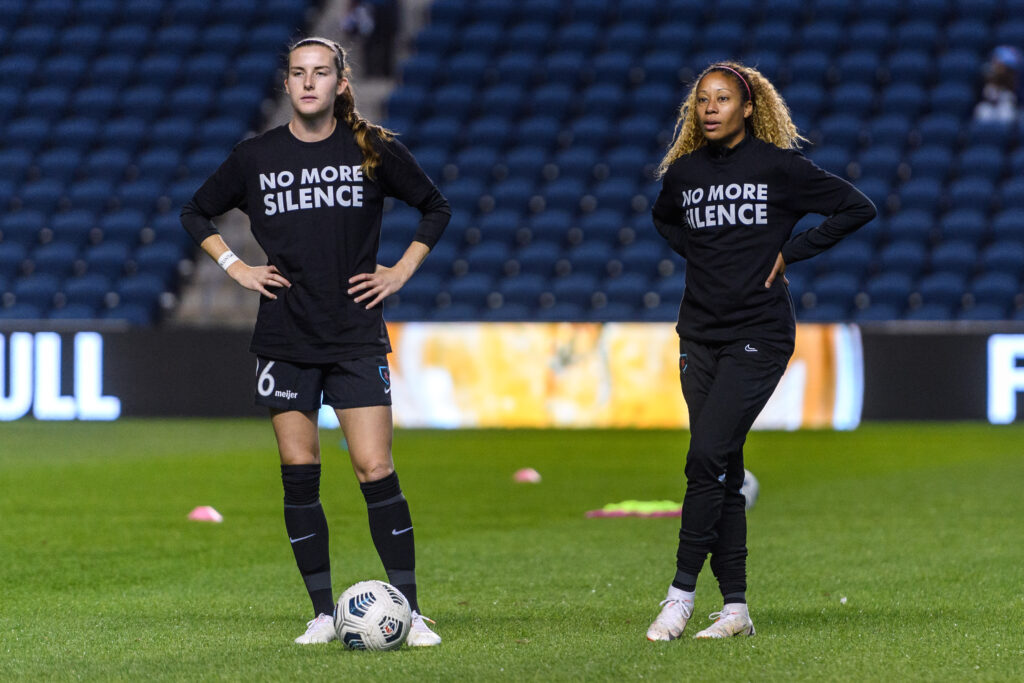
Even at the Olympics, Davidson says injury is part of the game
But the team’s Olympic victory didn’t come without setbacks, especially for Davidson. The center-back tore her ACL while training with her then-club team the Chicago Red Stars in 2022, failing to make the Australia-bound World Cup roster in 2023 before working her way back into the lineup over the past year. In France, Davidson left the USWNT’s second group stage match in the 44th minute after suffering a knee-to-knee collision with German player Jule Brand. The knock sidelined the regular starter for the following two games, with fellow defender Emily Sonnet taking over her position while she recovered.
"You wouldn't wish it upon anyone to get injured during a tournament, especially a tournament that you blink and it's over," the Gotham FC defender reflected. "It's just part of the game and it is what it is, [and] people are ready to step in and fill the role that needs to be filled."
As Davidson explained, her previous season-ending injury helped her maintain such a measured mindset under the Olympic lights, one that carried her through all the way to the finish line. "Unfortunately it's something that you agree to when you sign up to be a professional athlete: You agree to the uncertainty, you agree to the possibility of injury," she said matter of factly. "My story is not unique in that sense — people get injured, people get traded, choose to go to a new team, or get left off a roster. I think that that's what makes the moments of triumph so much sweeter."
"There are bits of it that only I will know and only my family will know, and that's why we have to celebrate these moments and appreciate these moments," she added. "Because for us as athletes, they're very fleeting, and there are a lot of darker moments that lead to these ones — [it’s] important for our growth as players and as people. So I wouldn't change it."
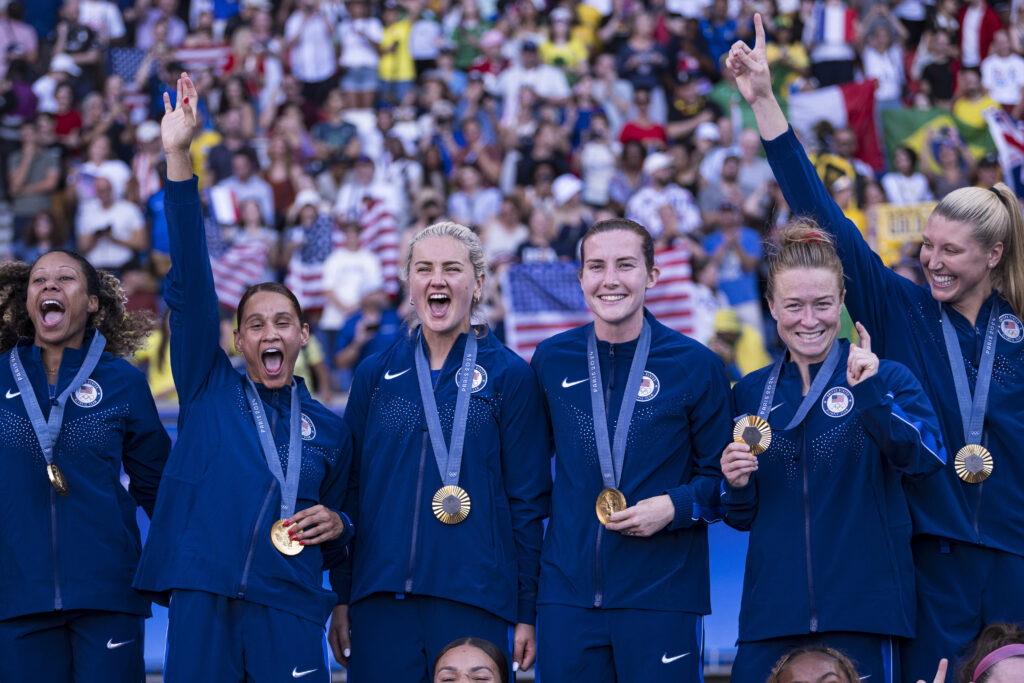
To overcome Olympic uncertainty, the USWNT turned to joy
From the first time they took the pitch in the South of France, any onlooker could tell there was something different about this US Women’s National Team. The tensions, miscommunications, and grimaces that hung over the last two major tournaments appeared to have dulled, passes looked more fluid, and goals were celebrated with more unbridled gusto.
While the pressure to take home the title and reclaim their previous spot at the top of the FIFA rankings was definitely there — the USWNT dropped to fifth place after the 2023 World Cup, the lowest they’ve sat since FIFA started ranking women’s teams — it didn’t seem to burden the players for the first time in years.
Perhaps all the recent change helped to simplify the team’s outlook heading into the Games. After all, for Davidson, change has been a constant.
"We had a relatively different roster and a lot of uncertainty with a new coaching staff coming in, so it's really a testament to our commitment to each other [that] we just all walked in and decided we were gonna do it whether it was perfect or not," she explained. "Understanding there were going to be bumps in the road and not expecting perfection from ourselves, not putting ourselves under that kind of unrealistic pressure… to just be okay with that and to be able to turn to each other if we needed. Everyone really bought into that."
After the final whistle blew at the gold medal game in Paris, NBC asked a visibly emotional Emma Hayes how she managed to get the USWNT, after all they’ve been through, to buy into a new coach’s philosophy so quickly and wholeheartedly.
"Just love," she responded. "I come from a place of wanting players to enjoy themselves."
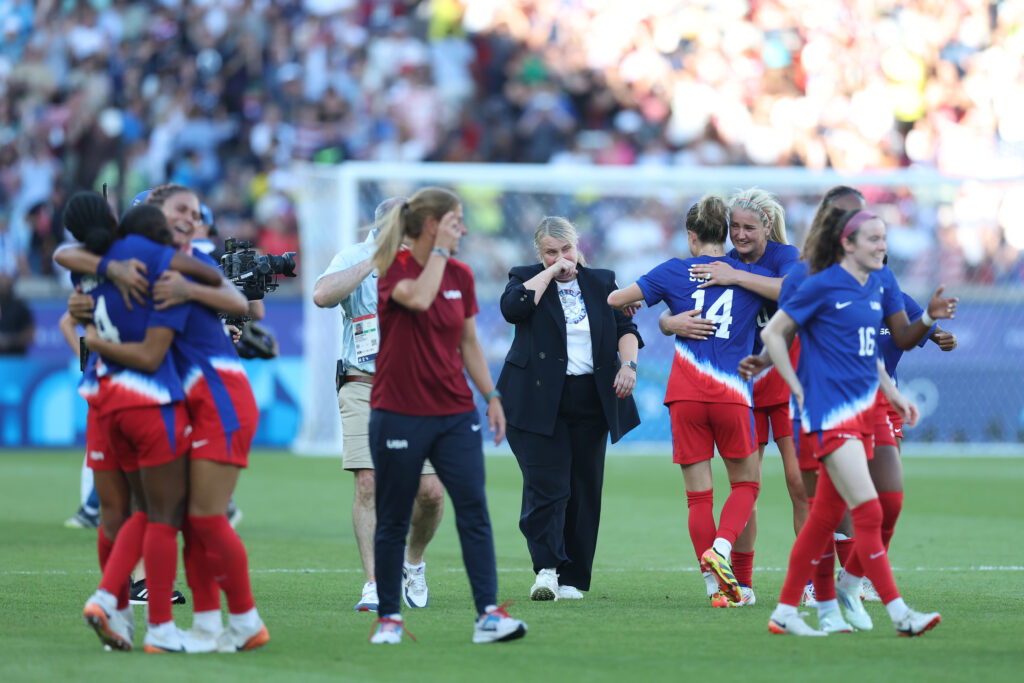
The word "joy" permeated every interview that followed, from striker Mal Swanson’s postgame comments to captain Lindsey Horan, who, when asked when joy had returned to the squad, told reporters "To be perfectly honest, the past two months."
Davidson echoed their sentiment. "Each game that we play is a 90-minute game — in some cases 120 — but we have the same objective that we always do," she said of the team’s mentality under Hayes. "That really released us and allowed us to play with joy and play with each other as teammates but also as friends… This group got a taste of what it's like to win at the international level on a big stage, and I think everybody wants to be back there again."
Throughout the tournament, that joy spilled over into the team’s off-pitch endeavors. Social media posts of players putting the finishing touches on lego sculptures and jigsaw puzzles permeated the internet, while videos of them leading a particularly passionate singalong in the Team USA bus took on a life of their own.
"I mean I'm not one of the avid Cheetah Girls fans on the team but we do have a few," said Davidson when asked how "Strut" by the fictional Disney Channel teen pop group became the team’s Olympic anthem. "We were trying to decide what our new walkout song would be — like the last song we play before we leave the locker room for warm-ups — and a few different options were thrown out and that’s the one that raised the locker room to new levels."
For the USWNT, leveling up has never before looked so fun.
